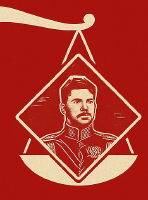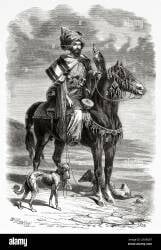The Jumaily Kingdom of Iraq
Government & Ideology:
A referendarchist technocratic nationalist monarchy, Jumaily Iraq unites the best of rulership and expertise. The mixed, Arab, Kurdish, Armenian King Ahmed I Al‑Jumaily who alone resembles mixed Mesopotamian identity (Iraqi, Kurdish, Armenian), reigns as head of state, while a technocratic Council of Ministers—experts elected via nationwide referenda every six years—handles executive decisions. This secular realm values civic identity over creed, celebrating its Iraqi‑Mesopotamian roots between the Tigris and Euphrates.
Referendarchism at Work:
Binding referendum votes shape everything from economic reforms to environmental regulations, blending democratic legitimacy with technocratic efficiency.
Nation-Building Pillars:
Cultural Heritage: Embraces Sumerian, Akkadian, Assyrian, Babylonian, Abbasid, and modern Iraqi traditions through national holidays, curricula, and public arts.
High-Tech Economy: A leader in AI-powered infrastructure, green tech, and innovated desert irrigation systems.
Modern Military: The Mesopotamian Defense Corps specializes in drones, cyber-defense, and smart-uniform tech—all under civilian technocratic control.
Alliance Distinction on the World Stage:
As a proactive member of the United Ummah, Jumaily Iraq was officially inducted as a Mohtaseb on June 22, 2025, in recognition of its moral guidance, technological contributions, and exemplary governance within the alliance.
After 75 days of alliance seniority, I have officially departed from United Ummah.
Alongside the Vizier of IA, Saif Ali, and the Agha of IA, Goodman, I—formerly a Mohtaseb of IA—have taken the next step in our strategic journey.
On July 24th, 2025, I joined Vought International as an MA (Military Affairs), where I will be trained and refined into a model military strategist and defense planner. This marks the foundation for a greater purpose: the creation of a new alliance in October 2025, alongside Saif Ali, Goodman, and Ali Al Shammari
| National Factbook |
| Flag: |

|
| Nation Name: |
The Hilali Kingdom Of Iraq |
| Leader Name: |
Ahmed Raed Kamil |
| Currency: |

Diamond Standard |
| National Animal: |

Kurdish Horse |
| History: |
The kingdom rose from the ashes of Iraq’s chaotic past, led by Ahmed Raed Kamil, a descendant of both noble Arab bloodlines, Kurdish and Armenian blood, and scholarly traditions. Guided by visions of unity and justice, he declared the founding of a modern monarchy—built not on tyranny, but wisdom.
Rumors whisper that the Royal Seal of Jumaily is linked to an ancient covenant stretching back to the Abbasid Caliphate... but that’s a tale for another scroll. 📜
📜 Origins of the Crown:
The Jumaily Kingdom traces its bloodline back to the House of Jumail, a noble Arab family said to have served under both the Abbasid Caliphate and the Ottoman Empire as administrators, scholars, and military officers. After the collapse of Iraq’s modern republic in the 21st century, the House went underground, preserving knowledge, tradition, and leadership in secrecy.
⚔️ The Fractured Era:
Following decades of instability, corruption, and foreign intervention, Iraq became a fragmented land—warlords, militias, and external actors fighting for control. But among the chaos, whispers of an heir from the House of Jumail began to surface—a young man named Ahmed Raed Kamil.
“Not born of palace marble, but of desert dust and firelight.”
Ahmed united tribal leaders, scholars, and exiled technocrats under one vision: a stable Iraq ruled not by force, but by intellect and legitimacy. In a historic council held near Najaf, he was crowned King of Iraq—but only under the condition that his rule would be subject to the will of the people every 3 years.
Thus, the Referendarchy was born.
🏗️ The Founding of the Kingdom:
On May 7, 2025, the Jumaily Kingdom of Iraq was formally declared. The nation quickly formed a Council of Knowledge, drawing experts in economics, defense, faith, and science to help rebuild Iraq from the ground up.
Within days, the capital—Baghdad al-Mamlakah—was established as both a physical seat of power and a cultural rebirth. Construction began, trade routes were secured, and diplomatic overtures were sent across the Muslim world.
🌐 Present Day:
The kingdom is currently in its first royal term, with King Ahmed enjoying strong approval ratings. However, internal pollution crises and external diplomatic uncertainty present early challenges.
The Jumaily Kingdom has applied for membership in the United Ummah, hoping to align with fellow Islamic states and strengthen its place on the world stage.
But beneath the surface, ancient rivalries, foreign interests, and ideological threats still linger… |
| Geography |
| Continent: |
Asia |
| Land Area: |
64,697.08 sq. km |
| Terrain: |
🏞️ Terrain & Geography
The Jumaily Kingdom of Iraq is a land of contrast—harsh deserts, fertile rivers, ancient mountains, and sacred plains. Its territory spans 3,200 square miles, centered around a reborn Baghdad and the Tigris River, blending historical geography with modern infrastructure.
🏜️ The Southern Dunes (Al-Rimal al-Janubiyya)
A vast stretch of sun-scorched desert, scattered with oases and ancient ruins. This region is lightly populated, used mostly for oil extraction, military testing zones, and desert nomad tribes who’ve pledged loyalty to the Crown.
⚠️ Extreme heat
🛢️ Major oil fields
🏕️ Home to Bedouin clans and smugglers
🌾 The Riverlands (Bilad al-Nahrayn)
Centered around the Tigris River, this fertile strip is the agricultural and cultural heart of the nation. Rice, wheat, dates, and pomegranates thrive here, and it's where Baghdad al-Mamlakah stands tall—a modern capital with deep historical roots.
🏙️ Capital & high-density population
🌉 Modern bridges + ancient ruins
🍇 Agriculture-rich zone
⛰️ The Crown Heights (Jibal al-Taj)
To the northeast lie the Crown Heights, a mountain range rich in minerals and myth. Snow touches the peaks in winter, and the area is home to Kurdish and Armenian minorities who are protected under royal decree.
⛏️ Mining hubs for copper and iron
🧭 Old shrines and forgotten fortresses
❄️ Coolest climate in the kingdom
🌫️ The Veiled Marshes (Al-Ahwaar al-Mughallafa)
These misty wetlands in the southeast are steeped in lore. Once home to the Marsh Arabs, now a guarded ecological reserve and rumored to be the hiding place of an ancient relic tied to the monarchy.
🏛️ National Capital: Baghdad al-Mamlakah
A city reborn. Modern walls, bullet trains, and clean energy projects surround relics of the Abbasid Golden Age. The Royal Palace is built atop a restored ziggurat base, merging the ancient and futuristic. |
| Highest Peak: |
Mount Qara’adin (جبل قرعادين),
3,317 meters
|
| Lowest Valley: |
The Zeenash Hollow (وادي الزيناش),
-27 meters
|
| Climate: |
🌦️ Climate
The Jumaily Kingdom experiences a semi-arid to arid climate, heavily influenced by desert winds, river humidity, and seasonal shifts. Its weather patterns define everything from architecture to military strategy.
☀️ Summer (May–September)
Brutal. Relentless. Solar-powered fury.
Avg Temp: 43°C (110°F)
Heatwaves can push temps up to 50°C (122°F) in southern regions.
Dust storms ("Shamal") roll in like apocalyptic waves, disrupting trade and comms.
Water conservation becomes mandatory; citizens operate on solar siestas and night shifts.
“The kingdom doesn't sleep—it cools.”
🍂 Autumn (October–November)
Transitional season—tempers ease, life returns to the streets.
Avg Temp: 25–30°C (77–86°F)
Agricultural high season in the Riverlands
Cultural festivals like the Festival of First Rains and Night of Lanterns happen here
❄️ Winter (December–February)
Cool but not freezing, except in the mountains.
Avg Temp: -3–18°C (50–68°F)
Snowfall in Crown Heights, rare frost sightings in Baghdad
Rivers swell, and some marshes flood—this is rebuilding season for infrastructure and spiritual reflection
🌱 Spring (March–April)
Short, lush, and symbolic.
Avg Temp: 20–30°C (68–86°F)
The marshes bloom, the Tigris flows strong, and food markets overflow
Seen as a divine “reset” by many citizens—a popular time for referendums and royal addresses
⚠️ Climate Challenges:
Desertification in the South
River Pollution near urban zones
Resource strain due to rising populations and industrialization
Kingdom is currently pushing a Green Vision 2030 project: solar expansion, river cleaning, and vertical farming.
|
| People & Society |
| Population: |
3,453,950 people |
| Demonym: |
Iraqi |
| Demonym Plural: |
Iraqis |
| Ethnic Groups: |
Iraqi Arabs - 63.0%
Kurds - 27.0%
Assyrian - 7.4% |
| Languages: |
Arabic (Iraqi) - 0.0%
Kurdish - 0.0%
Assyrian - 0.0% |
| Religions: |
Sunni Islam - 0.0%
Shia Islam - 0.0%
Orthodox Christianity - 0.0% |
| Health |
| Life Expectancy: |
72 years |
| Obesity: |
18% |
| Alcohol Users: |
46% |
| Tobacco Users: |
8% |
| Cannabis Users: |
9% |
| Hard Drug Users: |
3% |
| Economy |
| Description: |
💰 Economy of the Jumaily Kingdom of Iraq
The economy of the Jumaily Kingdom of Iraq is a unique hybrid—an authoritarian capitalism intertwined with state-controlled socialism, designed to serve both the traditional Jumaili elite and the rising demands of modern society. This delicate balance is enforced by the royal family, whose economic policies aim to stabilize the nation while fostering growth and national pride.
💼 Capitalist Core with State-Managed Elements
At the heart of the Kingdom’s economy lies a capitalist market driven by private enterprise, foreign investment, and high-level trade. However, the state holds significant influence, particularly in key industries and the financial sector, in order to ensure that the royal family maintains control and wealth.
Key Industries:
Oil: Iraq's vast reserves are still the main economic driver, though the Jumaily Kingdom is diversifying.
Renewable Energy: The Kingdom is heavily investing in solar energy and wind farms to ensure long-term sustainability.
Technology & Innovation: The government is pushing for a “Silicon Baghdad”—a tech hub to attract global investment and turn the Kingdom into the Middle East's digital capital.
Private Enterprises:
Manufacturing: Including automobile production (inspired by older industrialization efforts).
Financial Services: Banking and investment firms are increasingly becoming private but are overseen by government regulators. The Jumaily Bank is the largest institution, with ties to the royal family.
Foreign Investment: Foreign companies, particularly from Isilia, Caliphate, and Western powers, are pouring money into the Kingdom, attracted by its rich natural resources and burgeoning technological sector.
🏗️ Socialist/State-Controlled Aspects
Despite its capitalist leanings, the Kingdom’s royal family has maintained strict control over critical sectors, including healthcare, education, and infrastructure development. The Jumaili monarchy sees these as foundational to the Kingdom’s long-term stability and security.
State-Owned Enterprises:
Oil Extraction: The royal family owns the majority of Iraq’s oil fields and refineries, controlling the flow of wealth from this essential industry.
Healthcare & Education: Both sectors are fully subsidized by the state, though private hospitals and schools are gaining prominence among the elite.
Agriculture: Large-scale farming operations for wheat, dates, and rice are managed by state-controlled entities, ensuring food security and maintaining traditional agricultural practices.
Welfare System:
The Kingdom maintains a universal welfare system, providing housing subsidies, food security programs, and pension plans to citizens in the lower-income brackets.
While the state provides for the citizens, there is still a strong class divide between the royal elite and the working class.
🌐 International Trade & Relations
Strategic Position: Iraq's geographical location, sitting between Asia and the Arab world, gives it significant leverage in international trade, particularly with its access to the Persian Gulf.
Export-Import: The Kingdom exports oil, natural gas, and textiles, while importing electronics, military technology, and consumer goods.
Trade Partners:
Isilia: Strong economic ties with Isilia, with joint ventures in mining and energy development.
Western Powers: Trade agreements with America and Europe have driven the technological boom.
Caliphate: The Caliphate provides access to arms and military technology, while the Kingdom offers strategic resources.
⚖️ Income Inequality & Political Tension
While the Kingdom’s economy is growing, there is significant wealth disparity. The royal family and a handful of oligarchs control the majority of the nation's wealth, while the working class lives modestly. Tensions between rural and urban populations have sparked protests over wealth distribution, especially in the southern marshlands.
Rural Areas: The southern marshes are still primarily agricultural and rely on government subsidies. Many feel excluded from the economic growth happening in the capital, Baghdad.
Urban Areas: The capital and northern cities are booming with development, leading to a thriving middle class that is often at odds with the aristocratic elite.
🚀 Looking to the Future
The Kingdom’s economic future hinges on its ability to modernize without losing its cultural roots. The monarchy’s vision of a post-oil economy relies heavily on technological innovation, renewable energy, and maintaining political stability. The Green Vision 2030 is the Kingdom’s roadmap to becoming a global leader in sustainable energy and smart city development.
However, political opposition continues to challenge the monarchy’s grip on power. Socialist movements and capitalist elites are both jockeying for influence, with key events like referendum cycles and royal decrees constantly shifting the landscape. |
| Average Yearly Income: |
$262.00 |
| Gross Domestic Product (GDP): |
$6,891,274,096.00 |
| GDP per Capita: |
$1,995.19 |
| Gross National Income (GNI): |
$4,810,948,200.00 |
| Industries: |
Oil, mostly oil. |
| Military |
| History: |
💥 Military Forces of the Jumaily Kingdom of Iraq
The Jumaily Kingdom maintains a formidable military, designed to protect the monarchy, secure its territorial integrity, and project power in the region. It is composed of elite units, technologically advanced divisions, and paramilitary forces that operate under both state and royal family directives.
⚔️ Branches of the Military
1. Royal Armed Forces of the Jumaily Kingdom (RAFJK)
The primary military body responsible for national defense, external operations, and elite royal guard duties.
Command Structure: Directly overseen by the King and senior royal advisors. The Minister of Defense holds operational control.
Major Divisions:
Infantry & Armored Corps: Well-equipped with modern tanks, infantry fighting vehicles (IFVs), and specialized artillery.
The Wings of Zaggurat: Includes fighter jets, bombers, and advanced drones. Key defense partner for air superiority.
The Tigris Waves: Controls the Persian Gulf coastlines, patrolling oil exports and ensuring maritime security.
Special Operations Command: Elite units that conduct covert operations, counterterrorism, and intelligence gathering. Known for their highly trained operatives, often deployed on sensitive, high-risk missions.
2. The Tigris Guard (الحرس تيغريس)
The personal bodyguard force of the King and the royal family, composed of the best-trained soldiers from across the kingdom.
Specialized Training: Includes advanced close combat and security protocol. The Tigris Guard is known for its loyalty and fanatical devotion to the monarchy.
Armament: Equipped with personalized firearms, bulletproof vehicles, and unmarked helicopters for high-value operations and ceremonial duties.
3. The People's Militia (الميليشيا الشعبية)
A paramilitary force tasked with maintaining internal order and supporting the Royal Armed Forces during times of war or unrest.
Structure: Comprised of volunteers and conscripts from all corners of the Kingdom. While less elite than the Royal Forces, they are numerous, and their loyalty to the monarchy is unwavering.
Role: Primarily focused on counterinsurgency, border security, and maintaining a military presence in the more rural and rebellious areas of the Kingdom, particularly in the southern marshlands and Kurdish-controlled zones.
4. The Royal Airborne Brigade
Elite Unit trained for paratrooper operations, urban warfare, and airborne assaults.
Known for being the first responders in crisis zones, whether it’s a border conflict or an internal royal threat.
🌍 Military Strategy & Doctrine
Doctrine of "Total Security": The Jumaily Kingdom employs a military strategy based on total security, meaning military presence is widespread in both urban centers and rural zones. This ensures that no part of the Kingdom can rise against the royal family, and it maintains constant surveillance over potential rebellions or uprisings.
Technological Superiority: The Kingdom heavily invests in military technology to stay ahead of regional rivals. Its military includes cyber warfare units, stealth bombers, and surveillance drones designed for reconnaissance and precision strikes. The Royal Tech Divisions often collaborate with global powers like Isilia for cutting-edge defense technology.
Modernization and Training: The military regularly holds joint exercises with allies and places a strong emphasis on modern warfare tactics. The Jumaily Armed Forces are proficient in urban combat, desert warfare, and oilfield defense, thanks to Iraq’s diverse geography.
🌐 Foreign Military Alliances & Engagements
Isilian Alliance: The Kingdom shares military alliances with Isilia, particularly in technological defense and training. The Jumaily Kingdom hosts joint drills and is working on creating a regional defense pact.
Caliphate: Though not a formal ally, the Kingdom maintains military cooperation with the Caliphate, especially on border defense and counter-terrorism.
Western Support: The Kingdom receives arms deals and military aid from America and European nations, strengthening its position as a regional power. Western military instructors frequently visit to train Jumaili officers in modern tactics.
💥 Military Challenges & Issues
Internal Rebellions: The Kingdom struggles with insurgency and rebel factions from minority ethnic groups and disaffected regions, notably the southern marshlands and Kurdish populations.
Regional Tensions: The military is constantly on alert due to tensions with neighboring nations, particularly regarding oil reserves and border disputes. The Kingdom’s military plays a crucial role in safeguarding vital resources.
Corruption and Loyalty Issues: While the monarchy has established a loyal military, there are concerns about corruption within lower ranks, especially in the People’s Militia and regional forces.
🚀 Future of the Military
The Kingdom is focused on military modernization through AI-powered weapons, autonomous drones, and space surveillance systems. It plans to become a regional military powerhouse, with a focus on rapid response forces, covert operations, and space-based defense systems.
The King has made military reforms a cornerstone of his rule, aiming to create a modernized, highly efficient fighting force. With the continued influx of foreign investment and technological partnerships, the Kingdom is positioning itself as a formidable force in the Middle East. |
| Soldiers: |
0 |
| Tanks: |
10,000 |
| Aircraft: |
1,500 |
| Ships: |
100 |
| Missiles: |
18 |
| Nuclear Weapons: |
0 |
| Last Updated: 05/09/2025 07:15 pm |



















